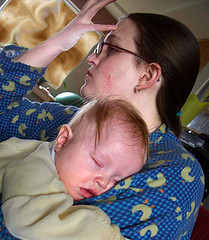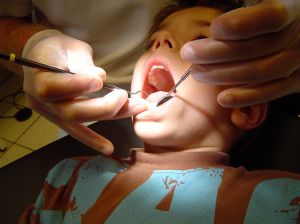How to Treat a Wasp Sting
 Last week, my son was stung by a wasp on his hand. He didn’t cry and he didn’t have a reaction until about two days later. His entire hand was swollen and red. I called my pediatrician and the nurse told me to just keep an eye on it and to bring him in if it became hot to the touch. It cleared up after about two days of redness and swelling. The day after it cleared up, he was stung by another wasp! (We found the nest and my husband has reclaimed our backyard from those horrible creatures!) Again, we didn’t notice any reaction at all and he didn’t cry or act like it hurt. Two days later, his entire arm was swollen and this time, incredibly hot to the touch. There was a huge red spot covering his entire bicep. While the reaction was similar to the first sting, it was a lot more intense. So, I called the doctor and he wanted me to bring him in. I shamefully told him that my son had been stung by wasps twice in the same week and reassured him we found the nest. The doctor thinks it is at high risk of becoming infected, so we were given instructions to prevent infection, which could turn to a staph infection. I didn’t know that wasp and bee stings could lead to infection. It makes sense when I think about it, but I thought allergic reactions such as breathing difficulty were the only real risk of wasp or bee stings.
Last week, my son was stung by a wasp on his hand. He didn’t cry and he didn’t have a reaction until about two days later. His entire hand was swollen and red. I called my pediatrician and the nurse told me to just keep an eye on it and to bring him in if it became hot to the touch. It cleared up after about two days of redness and swelling. The day after it cleared up, he was stung by another wasp! (We found the nest and my husband has reclaimed our backyard from those horrible creatures!) Again, we didn’t notice any reaction at all and he didn’t cry or act like it hurt. Two days later, his entire arm was swollen and this time, incredibly hot to the touch. There was a huge red spot covering his entire bicep. While the reaction was similar to the first sting, it was a lot more intense. So, I called the doctor and he wanted me to bring him in. I shamefully told him that my son had been stung by wasps twice in the same week and reassured him we found the nest. The doctor thinks it is at high risk of becoming infected, so we were given instructions to prevent infection, which could turn to a staph infection. I didn’t know that wasp and bee stings could lead to infection. It makes sense when I think about it, but I thought allergic reactions such as breathing difficulty were the only real risk of wasp or bee stings.
So, until my son’s boo boo heals, we are to do the following:
- Use ice to relieve pain or discomfort
- Apply hydrocortisone cream to it twice a day
- Take over-the-counter Zyrtec instead of Benedryl because our doctor thinks it works better and my son becomes hyper and wirey on Benedryl, which is opposite most children.
- Clean it twice a day with a clorox/water solution. I have never in my life heard a medical professional direct someone to use clorox bleach, so this was interesting to me.
- Fill a prescription for a steroid cream and have it on hand in case the red spot becomes streaky or asymmetrical and call or take him to the hospital right away.
I initially felt silly even being concerned about my son’s wasp sting, especially since I had already called the pediatrician last week about the same issue. I tend to write off what I consider small medical issues because I have three children who all carry their own set of more major medical issues as it is. But I am glad I listened to my gut that this reaction was worse than last week’s reaction. I have learned in parenting and medical care for my children is that medical professionals are paid by me (and my insurance) to answer my medical questions and treat my children, so I have given up on feeling guilty about using the service that I am paying for. Besides, what a parent may think is minor, may actually end up being serious, so it’s always better safe than sorry!
Have your children had a reaction to bee or wasp stings? Am I the only one whose never heard of cleaning an infected area with a clorox/water solution?
Share the fun: Email + Del.icio.us + Digg + Technorati






